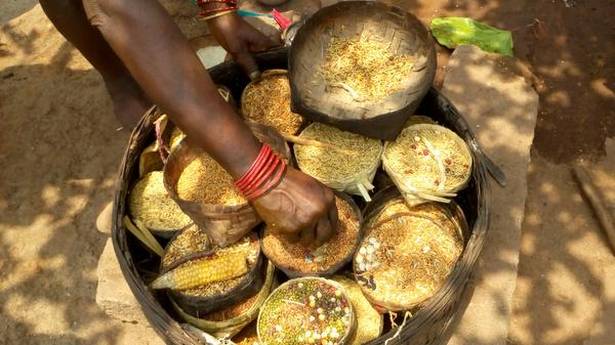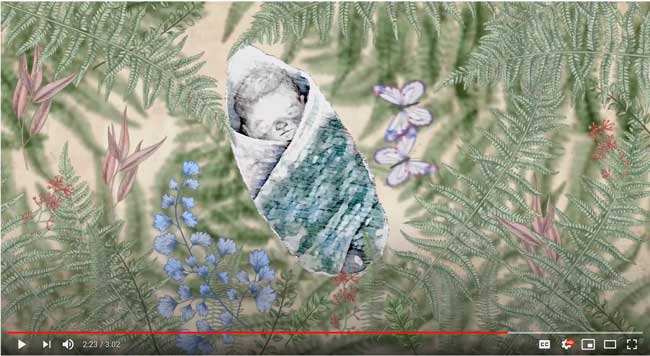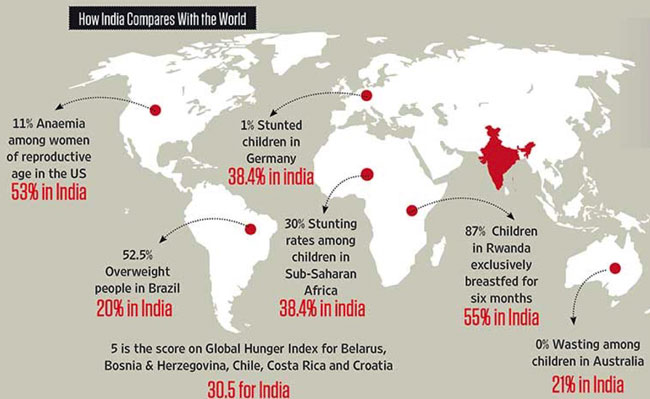
Photo © The Hindu >>
Health & nutrition | Revival of traditions >>
There will always be a seed for everyone | To read the full article and view more photos, click here >>
In the early summer month of April, around the magnificent Niyamgiri range in southern Odisha, the desi mango trees are already fruiting and mahua flowers have begun to blossom. Soon Kondh women will squeeze out the mango juice and dry it to make ambosoda, gather the mahua flowers to sell in the market while of its fruit they will make flavourful alcohol. These women have also harvested some forest turmeric and after boiling it, are beginning to dry and pound it. While the forests are replete, providing the adivasis of this area a nutritious diet in the midst of extreme heat and dryness, field work is at a lull and will only resume closer to the promise of the first rains.
During this time, in addition to the forests, people also depend on the foods harvested earlier on in the year: millets, pulses, tubers, dried fruits, roots and tubers. All these seeds have been safeguarded, some saved to be grown in the next season, while others have been stored to be eaten in months such as these. It is in this month that various Kondh communities organise the Bijun Parab or seed festival.
The festival begins with the mud walls of the home painted, the mud and cow dung floors swept and freshened, and, most importantly, the selecting of seeds. […]
In recent years, there has been an increasing effort to limit the human sharing of seeds, and the state has even created a large central authority to control this activity, which is simply one of collective and dignified survival. Seed bills and other such legislations that give less meaning to people’s seeds and more concessions to company-laboratory seeds, are being pushed. Adivasis, who live as one with the forests and land, are being bulldozed by such legislations and other forms of violence. We must remember that the Kondhs, many of whom live high up in the mountainous forests and call themselves Dongria Kondh, do not safeguard humanity with just their seeds. They do so with their food systems, their bond with the forests and wildlife, their belief system, social ways, and culture. Kondh society carries within it several lessons that can teach us about humanity itself.
Aditi manages to write. She shares this story in the written form, but the oral and lived experience was provided by many people who are fighting for humanity.
Source: “There will always be a seed for everyone” by Aditi Pinto, The Hindu (Sunday Magazine), 23 April 2017
Address: https://www.thehindu.com/society/there-will-always-be-a-seed-for-everyone/article18194781.ece
Date Visited: 17 July 2020
[Bold typeface added above for emphasis]

Watch “The Good Ancestor – The Legacies We Leave” (3 min.): An animation that explores the legacies we might leave for future generations >>
Links to some of the most important organisations, thinkers and doers that are leading the way and that have inspired the book The Good Ancestor by Roman Krznaric >>

Graphic © Outlook India 26 August 2019 >>
The tribal food basket has always been diverse and nutritious >>
Childrens rights: UNICEF India | Childrens right to education >>
“Health spending by the Indian government as percentage of GDP has long been one of the lowest for any major country, and the public health system is chronically dismal.” – Pranab Bardhan in “The two largest democracies in the world are the sickest now” | Learn more: Scroll.in, 24 August 2020 >>
“Cover Your Country” by PARI: Rural people speak about their lives through photos, narratives, film, and audio materials >>
Video | “I saw women working 90 per cent of the time. They did backbreaking jobs for which you need an erect spine,” says P. Sainath in Visible Work, Invisible Women: Bricks, coal and stone | RuralIndiaOnline.org >>
In Marginalised but not Defeated, Tarun Kanti Bose (a seasoned public interest journalist) asserts that “the mainstream development paradigm is being questioned and new rainbows of collective, community reassertions are happening across the tribal belt in India. More so, in most cases, led by brave, empowered and resilient women.” | Learn more: https://countercurrents.org/2023/05/book-review-marginalised-but-not-defeated >>
“In less than 200 years, photography has gone from an expensive, complex process to an ordinary part of everyday life. From selfies to satellites, most of the technology we use and spaces we inhabit rely on cameras. […] While photographic documentation can aid in shaping history, it can also be a window into the horrors of the past.” – Read more or listen to Butterfly Effect 9 – The Camera on CBC Radio Spark 26 May 2023 >>
Reports in the Indian press | List of periodicals included in this search >>
Search tips
Combine the name of any particular state, language or region with that of any tribal (Adivasi) community.
Add keywords of special interest (music, poetry, dance just as health, sacred grove and biodiversity); learn about the rights of Scheduled Tribes such as the “Forest Rights Act” (FRA); and the United Nations “Declaration on the Rights of Indigenous Peoples”, “Universal Declaration of Human Rights”, “women’s rights”, or “children’s right to education”.
Ask a question that includes “tribal” or “Adivasi”, for instance: “Adivasi way of life better?” (or “tribal way of life worse?”)
Specify any particular issue or news item (biodiversity, bonded labour and human trafficking, climate change, ecology, economic development, ethnobotany, ethnomedicine, global warming, hunter-gatherers in a particular region or state, prevention of rural poverty, water access).
For official figures include “scheduled tribe ST” along with a union state or region: e.g. “Chhattisgarh ST community”, “Himalayan tribe”, “Scheduled tribe Tamil Nadu census”, “ST Kerala census”, “Particularly Vulnerable Tribal Group Jharkhand”, “PVTG Rajasthan”, “Adivasi ST Kerala”, “Adibasi ST West Bengal” etc.
In case the Google Custom Search window is not displayed here try the following: (1) toggle between “Reader” and regular viewing; (2) in your browser’s Security settings select “Enable JavaScript” | More tips >>
Note: hyperlinks and quotes are meant for fact-checking and information purposes only | Disclaimer >>
Learn from M S Swaminathan – a world renowned scientist – how biological diversity contributes to public health, people’s livelihood and environmental security in addition to food security: his call on fellow citizens to use and share resources in a more sustainable and equitable manner; outlining the long journey from the 1992 Earth Summit to a commitment to foster inherited knowledge through India’s Biodiversity Act and Genome Saviour Award; an award intended to reward those who are “primary conservers” – guardians of biological diversity!
More about the work of his foundation which “aims to accelerate use of modern science and technology for agricultural and rural development to improve lives and livelihoods of communities.” – www.mssrf.org | Regarding the issues of food security raised above, and the nutritional value of indigenous grains, seeds and millets, read an in-depth report that concludes that “the tribal food basket has always been diverse and nutritious” >>
Up-to-date reports by Indian experts and journalists
Search tips
Combine the name of any particular state, language or region with that of any tribal (Adivasi) community.
Add keywords of special interest (music, poetry, dance just as health, sacred grove and biodiversity); learn about the rights of Scheduled Tribes such as the “Forest Rights Act” (FRA); and the United Nations “Declaration on the Rights of Indigenous Peoples”, “Universal Declaration of Human Rights”, “women’s rights”, or “children’s right to education”.
Ask a question that includes “tribal” or “Adivasi”, for instance: “Adivasi way of life better?” (or “tribal way of life worse?”)
Specify any particular issue or news item (biodiversity, bonded labour and human trafficking, climate change, ecology, economic development, ethnobotany, ethnomedicine, global warming, hunter-gatherers in a particular region or state, prevention of rural poverty, water access).
For official figures include “scheduled tribe ST” along with a union state or region: e.g. “Chhattisgarh ST community”, “Himalayan tribe”, “Scheduled tribe Tamil Nadu census”, “ST Kerala census”, “Particularly Vulnerable Tribal Group Jharkhand”, “PVTG Rajasthan”, “Adivasi ST Kerala”, “Adibasi ST West Bengal” etc.
In case the Google Custom Search window is not displayed here try the following: (1) toggle between “Reader” and regular viewing; (2) in your browser’s Security settings select “Enable JavaScript” | More tips >>
Note: hyperlinks and quotes are meant for fact-checking and information purposes only | Disclaimer >>
List of websites covered by this Google custom search engine
Academia.edu (platform for academics to share research papers) – www.academia.edu
Archive.org – https://archive.org
Centre for Science and Environment – https://www.cseindia.org
Current Conservation – https://www.currentconservation.org
Development and Cooperation (D+C) https://www.dandc.eu
Down To Earth (India) – www.downtoearth.org.in
India Environment Portal – www.indiaenvironmentportal.org.in
Harnessing Nature Magazine – https://harnessingnature.online
Kalpavriksh Environmental Action Group – https://kalpavriksh.org
Mongabay-India – https://india.mongabay.com
M S Swaminathan Research Foundation – www.mssrf.org
Navdanya (protecting India’s biodiversity based food heritage) – https://navdanya.org
Third World Network (Penang, Malaysia) – https://twn.my
The Shola Trust (nature conservation in the Nilgiri region) – www.thesholatrust.org
WorldCat (“the world’s largest library catalog, helping you find library materials online”) – https://worldcat.org
Research the above issues with the help of Shodhganga: A reservoir of theses from universities all over India, made available under Open Access >>
Note: hyperlinks and quotes are meant for fact-checking and information purposes only | Disclaimer >>
Related posts
Biodiversity | Hyderabad biodiversity pledge
Forest Rights Act (FRA) | Legal rights over forest land
Health and nutrition | Recommendations by the Expert Committee
Misconceptions | “Casteism” and its effect on tribal communities
Odisha / Orissa | State wise ST list (Scheduled Tribes)
People’s Archive of Rural India (PARI) | RuralIndiaOnline.org
People’s Linguistic Survey of India | Volumes (PLSI) | PeoplesLinguisticSurvey.org
Traditional methods in farming not forgotten by tribal communities: Old seeds festival
Women | Safe search | President Droupadi Murmu on women’s empowerment
